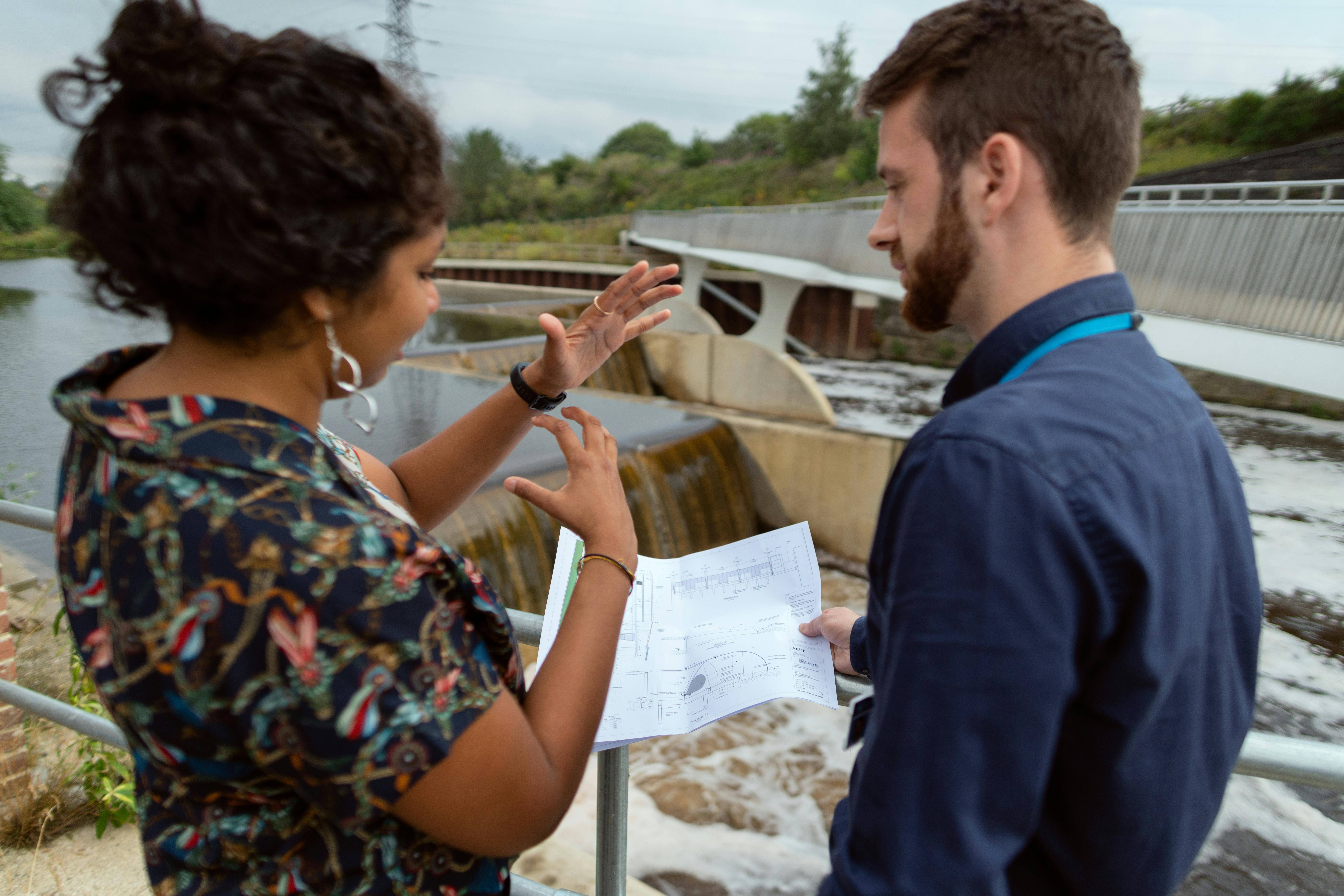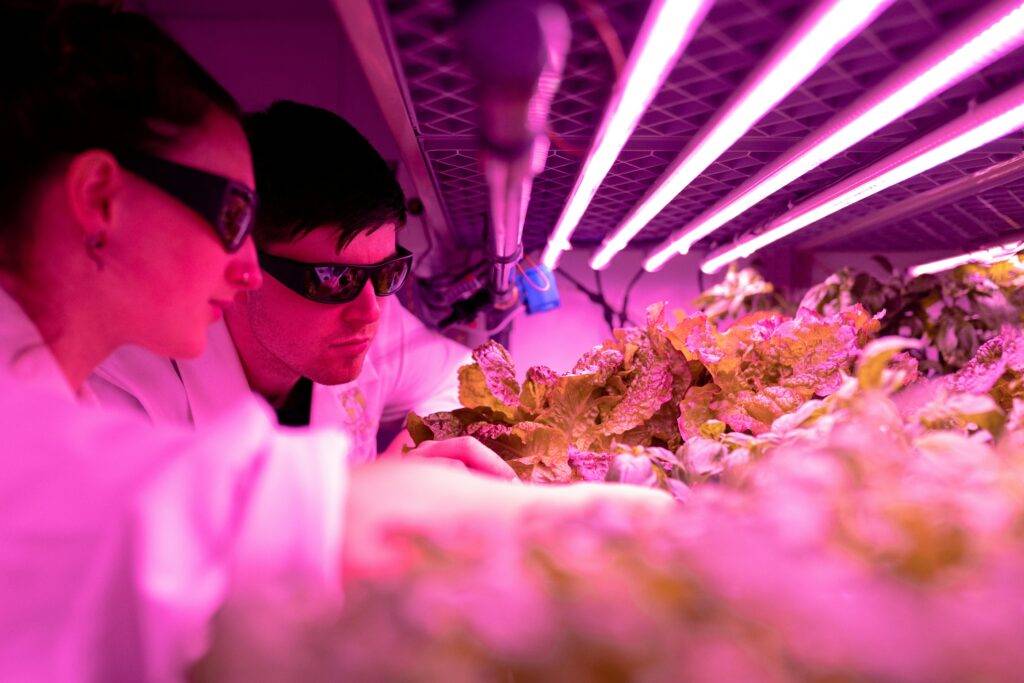Career Pathways in Climate Resilience
Guidance on the variety of opportunities involved in supporting the region to adapt and respond to climate change.

Welcome to your comprehensive guide on career pathways into the growing field of climate resilience. Whether you’re a novice looking to start a new career or a professional keen to upskill, this guide offers a clear roadmap to a rewarding career in helping to build the region's resilience to climate change.
What is Climate Resilience?
The UK’s growing focus on climate resilience is driving demand for careers across several sectors. Engineers and urban planners are needed to design resilient infrastructure, such as flood defences and heat-resistant buildings. Environmental scientists and data analysts are key to assessing climate risks and developing adaptation strategies. Roles in natural resource management, agriculture, and conservation are vital for protecting ecosystems and ensuring food security. Public health experts are required to address climate-related health risks, while emergency managers are needed to prepare for extreme weather events. Additionally, sustainability consultants and policy advisors play a crucial role in integrating climate resilience into business and government plans, helping the UK adapt to climate change.
The expected growth of careers in the climate resilience sector is significant, driven by the increasing urgency to adapt to climate change. In the UK, the need for resilience is growing due to rising risks from extreme weather events, flooding, and sea-level rise. The West of England's commitment to achieving net-zero emissions by 2030 has led to climate adaptation initiatives fuelling demand.
Engineers and urban planners are needed to design resilient infrastructure, such as flood defences and cooler cities. Environmental scientists and data analysts are key to assessing climate risks and developing adaptation strategies. In regions like the West of England, where much is imported, resilient local food production, infrastructure, and supply chains are vital for food security. Public health experts are required to address climate-related health risks, while emergency managers are needed to prepare for extreme weather events. Additionally, sustainability consultants and policy advisors play a crucial role in supporting businesses and residents adapt to climate change.

Why work in Climate Resilience?
You'll be helping the region to adapt to climate change, protecting lives, natural habitats, and infrastructure from growing climate risks.
You'll be at the forefront of addressing some of the most urgent global issues, from extreme weather events to food security and public health.
Work in a rapidly evolving sector that requires innovative thinking and creative problem-solving to develop new technologies, strategies, and infrastructure.
You get to work with a variety of different people and industries such as engineering, public health, policy, and environmental science, making the work stimulating and varied.
Join a growing sector as governments and businesses invest more in climate adaptation, offering numerous career opportunities and job security.
You can help safeguard vulnerable populations, ensuring fair access to resources, infrastructure, and healthcare in the face of climate impacts.
Empower yourself to be a part of the solution, working positively towards resilience, sustainability, and environmental change.
How to find the right course for you
If you are looking to start afresh in the climate resilience and sustainability sector, work experience, apprenticeships and technical education are all good routes to exploring new careers.
Option 1: University and Degree Apprenticeships
- Eligibility: 18+
Cost: Loans available to cover study. In case of degree apprenticeships, learners are paid (rates of pay vary)
Length: Varies depending on level and subject area but typically 3-5 years.
Benefits: Gain an in-depth knowledge and understanding of issues in this sector and network with professionals.
You can explore the variety of courses available on UCAS.
Option 2: Apprenticeships and Technical Education:
- Eligibility: 16+
Cost: Free. In case of apprenticeships, learners are paid (rates of pay vary)
Length: Varies depending on level and subject area but typically 1-5 years.
Benefits: Combines real work with training and study, where you get to put skills into practice.
You can explore the variety of courses, apprenticeships and technical education on the IfATE Occupational Maps. For local support and guidance, contact the Western Training Provider Network.
Option 3: Work Experience:
Experience is key to working in climate roles. Arranging a work experience placement is a great way to get a sense of the industry as well as build skills, gain experience and grow your network.
Professional organisations supporting different industries often provide advice on gaining work experience (look for links to ‘Professional and Industry Bodies’ at the bottom of this page)
If you have experience in a relevant role and want to widen your skillset to areas of climate resilience, there are lots of short courses available to you. Below are some examples of common types of training.
Option 1: Skills Bootcamps
- Eligibility: 19 years+
- Cost: Free
- Length: up to 16 weeks (part-time/flexible courses to help fit around commitments)
- Benefits: Great for upskilling and/or broadening your skillset to support progressing your work opportunities, often a fast-track to an interview.
Search for a relevant bootcamp, or read the stories of others who have completed them.
Option 2: Further Training or Continual Professional Development (CPD)
- Eligibility: Various
- Cost: Various
- Length: As little as a few hours, up to weeks or months depending on the subject.
- Benefits: Great for keeping up-to-date on industry standards and developments, and developing new skills.
You can also contact our Skills Connect Advisors who are happy to talk through the different options available to you
Specialist areas in Low-Carbon Transport
Roles in sustainable development focus on balancing economic, environmental, and social goals across sectors like urban planning, renewable energy, policy, and corporate responsibility. Together, these roles aim to build resilient, thriving communities that safeguard resources and promote well-being for future generations.
To find out which training providers in the region are offering local training opportunities in areas of Climate Resilience, head to the Skills Connect Directory.
Green careers in climate resilience focus on mitigating risks and enhancing preparedness for climate-related emergencies. Professionals in this field work in risk reduction, emergency management, and disaster recovery to develop strategies that protect communities from climate impacts. Roles include climate risk analysts and emergency response coordinators, aiming to strengthen community resilience, ensuring that societies can effectively respond to and recover from climate-related challenges while promoting sustainable practices for the future.
To find out which training providers in the region are offering local training opportunities in areas of Climate Resilience, head to the Skills Connect Directory.
Careers in Climate Science, Data and Analysis focus on understanding and interpreting climate-related information to inform decision-making and policy. Professionals in this field include climate scientists, who study climate patterns and trends; data analysts, who process and visualise climate data; and research scientists, who model climate scenarios to predict future impacts. They work with various organisations to provide insights on climate change effects, inform adaptation strategies, and support sustainability initiatives.
To find out which training providers in the region are offering local training opportunities in areas of Climate Resilience, head to the Skills Connect Directory.
Careers in Circular Economy and Waste Management focus on reducing waste and promoting sustainable resource use. Professionals in this field include waste management specialists, who oversee recycling and disposal processes; circular economy consultants, who help businesses adopt sustainable practices; and sustainability analysts, who assess and optimise resource efficiency. They work to design systems that minimise waste, extend product life cycles, and promote the reuse and recycling of materials.
To find out which training providers in the region are offering local training opportunities in areas of Climate Resilience, head to the Skills Connect Directory.
Careers in climate infrastructure are at the forefront of transforming cities, landscapes, and energy systems to adapt to the impact of climate change. Professionals in this field design and maintain resilient structures, green spaces, and innovative technologies. From harnessing renewable energy and designing eco-friendly buildings to planning climate-smart cities, these roles find innovative solutions through a variety of skills including engineering, urban planning, technology, and design.
To find out which training providers in the region are offering local training opportunities in areas of Climate Resilience, head to the Skills Connect Directory.
Careers in Climate Resilience
Explore some of the different careers in building climate resilience. There are different jobs for a variety of skills and industry areas. Have a look at some of the examples below.
Finding Support
Professional organisations and websites offer industry specific support, such as career advice, training, membership schemes, networking opportunities, as well as support with industry regulations or developments. Here are some websites and organisations dedicated to supporting Career in Climate Resilience:
Green Careers Hub is a website offering information and opportunities around green skills, jobs and careers
This is Engineering - a website dedicated to supporting people to enter into engineering roles.
Electrical Careers website offers industry related careers and training information and advice.
Professional Bodies
The Society for the Environment - a professional body providing support and resources for people working in environmental professions.

Talk to a friendly advisor
Feeling overwhelmed or not sure where to start? We’re more than a website, we have real people waiting to help with all your skills, training and career needs.



